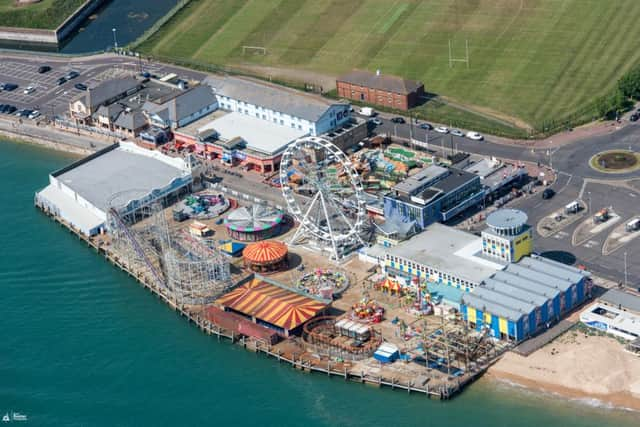Curse of Brent geese strikes again as birds bring end to Southsea Solent Wheel


A row over the birds, which have thwarted other key developments including a proposed new Pompey home ground, has prompted owners to not bring back the attraction to Clarence Pier in 2017.
Planning conditions on the ride stipulate it cannot be set up and running between October 1 and March 20 each year so it does not affect the migration of wintering birds – specifically Brent geese.
Advertisement
Hide AdAdvertisement
Hide AdNatural England had warned birds could otherwise collide with the wheel’s mobile pods on their flight path.
But the attraction’s bosses say the strict restrictions don’t allow them to take advantage of a full spring and summer window and profit from seafront tourists.
So they’ve decided the 110ft-high ride – built in Italy at a cost of £750,000 – won’t be back next year and it will go to another resort, though its new location has not been revealed.
Clarence Pier and Solent Wheel owner Jill Norman said: ‘We have no plans at present to bring the wheel back to Southsea next year.
Advertisement
Hide AdAdvertisement
Hide Ad‘This is because of the issues with the Brent geese, as we have to build up the ride after the summer season has started and pull it down before the summer season has ended.
‘Yet our field studies, carried out by an independent ecologist, have so far failed to identify any Brent geese sightings within the vicinity of Clarence Pier.’
She added: ‘The ride has only been passed for planning from the end of March to October. The issue is that a bird may strike into it.’
Frustrated city leaders who want to see the ride remain say their ‘hands are tied’ as they have to follow expert advice over the protection of birds.
Advertisement
Hide AdAdvertisement
Hide AdBut they say Mrs Norman has never given them a copy of her own bird survey.
Tory culture boss, Councillor Linda Symes, said: ‘We can’t do anything about that condition. I personally can’t see how it would harm the birds’ migration.
‘But we have to follow the advice we have been given from Natural England.
‘I would like to see the ride stay all year round, but our hands are tied.
‘But this was something the pier owners were aware of.
Advertisement
Hide AdAdvertisement
Hide Ad‘They said it was easy for them to take up and down, within two days, and that they had a place to keep it in the winter.
‘I don’t think this will adversely affect the seafront offer – though anything that improves the seafront is great. What impact it will have not being here, I am not sure.’
Cllr Symes added: ‘I found it rather strange. They’ve announced this and not let anyone know.
‘We have not seen a copy of the independent survey.’
The Solent Wheel is now open again after a boy and his grandmother were rescued from the fairground ride. Fire crews were called to free the pair on Monday.
Advertisement
Hide AdAdvertisement
Hide AdThe ride will remain open until Friday, September 30, before it is dismantled and moved.
Solent attraction is not the first case of bird strike
In 1993, then Pompey chairman Jim Gregory received planning permission to build a new stadium on the St John’s College playing fields in Farlington.
But a year later, a planning inspector threw out the St John’s plan because of problems over transport, but mainly because it was a grazing ground for Brent geese. In January this year, the council ditched plans for 25 new huts near Southsea Esplanade and another 25 on the northern edge of Eastney beach as Natural England had requested a three-year study showing whether the sites were an important home for birds.
‘We’ve got fears over the winter population’
NATURAL England has outlined its concerns over the Solent Wheel attraction.
Advertisement
Hide AdAdvertisement
Hide AdThey include bird ‘collision risks’ and how the ride could affect access to habitats.
A Natural England spokesperson said: ‘We were concerned about the potential impacts to internationally-important bird populations which fly between the land adjacent to the wheel and the mudflats in the nearby harbours during the winter to feed.
‘Tall structures so close to important feeding sites such as this can increase collision risks, and may deter the birds from accessing their increasingly scarce, but vitally important winter sites.
‘We worked with the developer and Portsmouth City Council to enable the wheel to be in place for the summer months but still have concerns about winter operation.
Advertisement
Hide AdAdvertisement
Hide Ad‘For the wheel to operate in the winter the applicant would need to submit bird survey information to demonstrate that winter operation would not have a significant effect on the birds.
‘To date the information provided by the applicant has not demonstrated that an impact is unlikely.
‘The council, as the decision maker in this case, considered the evidence, and the advice from Natural England and its ecologist, before determining the application.’